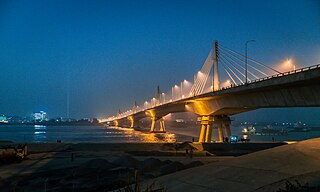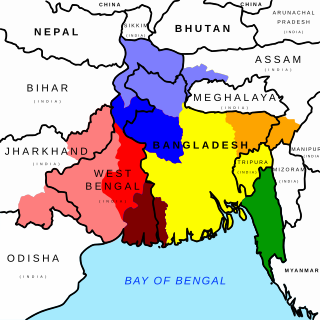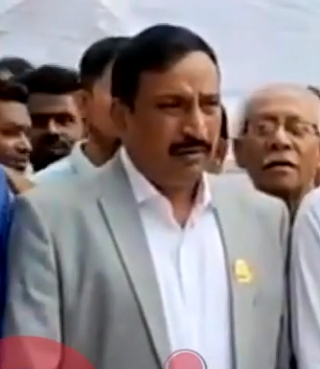Related Research Articles

The Chittagong Hill Tracts, often shortened to simply the Hill Tracts and abbreviated to CHT, are a group of districts within the Chittagong Division in southeastern Bangladesh, bordering India and Myanmar (Burma) in the east. Covering 13,295 square kilometres (5,133 sq mi), they formed a single district until 1984, when they were divided into three districts: Khagrachhari, Rangamati, and Bandarban.

Chittagong, officially Chattogram, is the second-largest city in Bangladesh. Home to the Port of Chittagong, it is the busiest port in Bangladesh and the Bay of Bengal. It is the administrative seat of an eponymous division and district. The city is located on the banks of the Karnaphuli River between the Chittagong Hill Tracts and the Bay of Bengal. The Greater Chittagong Area had a population of more than 5.2 million in 2022. In 2020, the city area had a population of more than 3.2 million. The city is home to many large local businesses and plays an important role in the Bangladeshi economy.

The Chakma people or Changhma people (Chakma:𑄌𑄋𑄴𑄟𑄳𑄦), are an ethnic group from the eastern-most regions of the Indian subcontinent and Western Myanmar. They are the largest ethnic group of the Chittagong Hill Tracts region of southeastern Bangladesh, and the largest in the Chakma Autonomous District Council of Mizoram, India. Significant Chakma populations are found in the northeast Indian states of Arunachal Pradesh, Tripura and Assam.

Khagrachari is a district in the Chittagong Division of Southeastern Bangladesh. It is a part of the Chittagong Hill Tracts region.

Bangladeshi cuisine has been shaped by the region's history and river-line geography. Bangladesh has a tropical monsoon climate. The staple of Bangladesh is rice and fish. The majority of Bangladeshi people are ethnic Bengali, accustomed to Bengali cuisine, with a minority of non-Bengalis, many used to cuisines from different traditions and regions. Bangladeshi cooking features more meat dishes than the cuisine of neighbouring West Bengal, India.

East Bengal ( was the eastern province of the Dominion of Pakistan, which covered the territory of modern-day Bangladesh. It consisted of the eastern portion of the Bengal region, and existed from 1947 until 1955, when it was renamed as East Pakistan. East Bengal had a coastline along the Bay of Bengal to the south, and bordered India to the north, west, and east and shared a small border with Burma to the southeast. It was situated near, but did not share a border with Nepal, Tibet, the Kingdom of Bhutan and the Kingdom of Sikkim. Its capital was Dacca, now known as Dhaka.

Bangladesh Islami Chhatrashibir is an Islamist student organization based in Bangladesh. It was established on 6 February 1977. The organisation is generally understood to be the student wing of Bangladesh Jamaat-e-Islami, and several of the leaders of the student organisation have gone on to become notable leaders within Jamaat.

Human rights in Bangladesh are enshrined as fundamental rights in Part III of the Constitution of Bangladesh. However, constitutional and legal experts believe many of the country's laws require reform to enforce fundamental rights and reflect democratic values of the 21st century.

Shahriyar Kabir(Bengali: শাহরিয়ার কবির; born 20 November 1950) is a Bangladeshi journalist, filmmaker, human rights activist, and author of more than 70 books focusing on human rights, communism, fundamentalism, history, and the Bangladesh war of independence. He was awarded Bangla Academy Literary Award in 1995.
The national language and official language of Bangladesh is Bangla according to the third article of the Constitution of Bangladesh. Almost 99% of Bangladeshis speak Bengali as their first language. Bengali Language Implementation Act, 1987 made it mandatory to use Bengali in all government affairs except in the cases of foreign relations. According to a 2022 census, Bengali is predominantly spoken by 99% of the country's population and it also serves as the national language of the nation. The indigenous people of northern and southeastern Bangladesh speak a variety of native languages. According to the Ethnologue, there are 36 indigenous living languages, which include 17 Tibeto-Burman, 10 Indo-Aryan, 7 Austroasiatic and 2 Dravidian languages in Bangladesh. Bangladesh has 44 indigenous languages according to Professor Shameem Reza.
The United Nations categorizes Bangladesh as a moderate democratic Muslim country. Sunni Islam is the largest religion in the country and in all of its districts, except Rangamati. The Constitution of Bangladesh refers to Islam twice: the document begins with the Islamic phrase Bismillahir Rahmanir Raheem and article (2A), added later, declares that: "Islam is the state religion of the republic".

The status of women in Bangladesh has been subject to many important changes over the past few centuries. Bangladeshi women have made significant progress since the country's independence in 1971, where women in the region experienced increased political empowerment for women, better job prospects, increased opportunities of education and the adoption of new laws to protect their rights through Bangladesh's policies in the last four decades. Still, women in Bangladesh continue to struggle to achieve equal status to men due to societal norms that enforce restrictive gender roles as well as poor implementation of laws that were set to protect women.

The insurgency in the Chittagong Hill Tracts refers to a political and armed conflict that occurred in Bangladesh in two phases:

Bangladeshis are the citizens of Bangladesh, a South Asian country centred on the transnational historical region of Bengal along the eponymous bay.

Hefazat-e-Islam Bangladesh is a far-right conservative-islamic advocacy group consisted mostly of hard-line religious teachers and students. The group is mainly based on qawmi madrasas in Bangladesh. In 2013, they submitted a 13-point charter to the Government of Bangladesh, which included the demand for the enactment of a blasphemy law.
Rangamati Medical College (RmMC) is a public medical school located in Rangamati, Bangladesh. The college is established in 2014. It admits 51 students every year. It offers 5 years course on Bachelor of Medicine & Bachelor of Surgery which is directed under Chittagong Medical University.

Nizam Uddin Hazari is an Awami League politician and a former Jatiya Sangsad member representing the Feni-2 constituency.

Sadeka Halim is an academic. She is the former and first female vice-chancellor of Jagannath University, appointed by the President of Bangladesh since November 2023. She was a professor at Dhaka University and the first female dean of the Faculty of Social Sciences of the university. She is the first female to be the Information Commissioner of Bangladesh.

Chittagong Hill Tracts Regional Council is the local government body responsible for the welfare and some administrations of the Chittagong Hill Tracts districts, which include Bandarban District, Khagrachari District, and Rangamati Hill District, in Bangladesh and is located in Dhaka, Rangamati. Jyotirindra Bodhipriya Larma also known as Santu Larma is the Chairman of the Chittagong Hill Tracts Regional Council. He is also the chairman of Parbatya Chattagram Jana Samhati Samiti.
The Bangladesh Minority Janata Party is a political party in Bangladesh, focused on the rights of minority communities, formed in 2017.
References
- ↑ Lee, Matilda. "Campaign Hero: Khushi Kabir, empowering Bangladesh's most vulnerable". The Ecologist. Retrieved 29 November 2017.
- 1 2 3 "Khushi Kabir". One Billion Rising Revolution. 10 July 2013. Retrieved 29 November 2017.
- ↑ "What do you do with rape victims? You send them away". Dhaka Tribune. Retrieved 29 November 2017.
- ↑ "Chittagong Hill Tracts: Indigenous Women Disproportionately Affected By Violence and Discrimination in Bangladesh". UNPO. Retrieved 29 November 2017.
- ↑ "'Health, global trade regime affecting equal access to medicine'". Dhaka Tribune. Retrieved 29 November 2017.
- ↑ "Call against land acquisition for army installations". Prothom Alo. Archived from the original on 1 December 2017. Retrieved 29 November 2017.
- ↑ "Empower women for a better world". The Daily Star. 9 October 2017. Retrieved 29 November 2017.
- ↑ "Court dismisses case against Khushi Kabir for allegedly 'slandering' PM". Dhaka Tribune. Retrieved 29 November 2017.
- ↑ "Rights activists: Communal attacks increasing because of culture of impunity". Dhaka Tribune. Retrieved 29 November 2017.
- ↑ "Govts cool on its full execution". The Daily Star. 26 November 2017. Retrieved 29 November 2017.